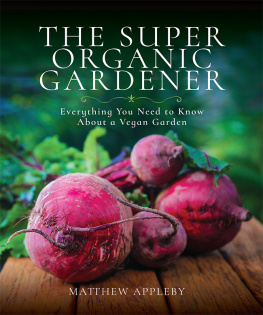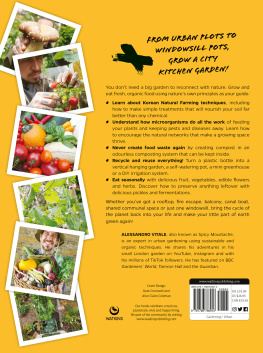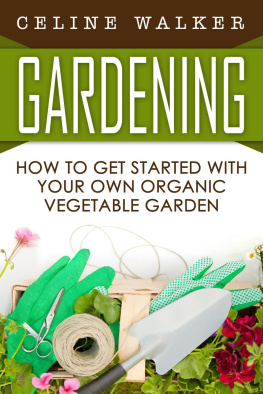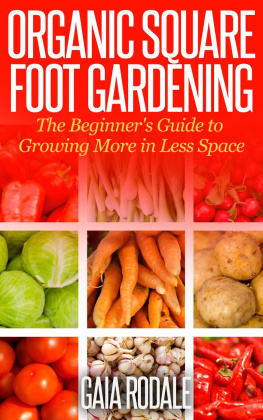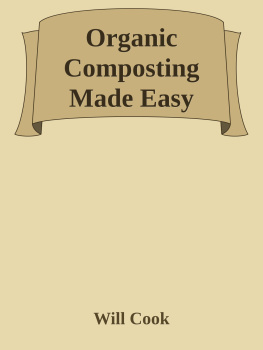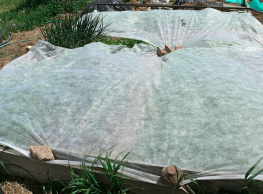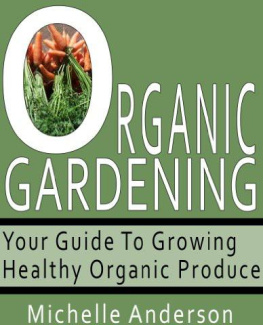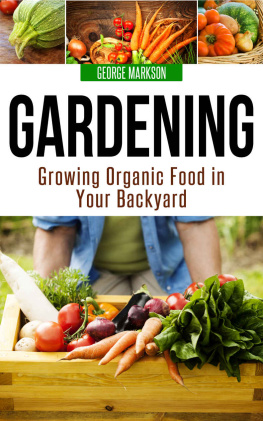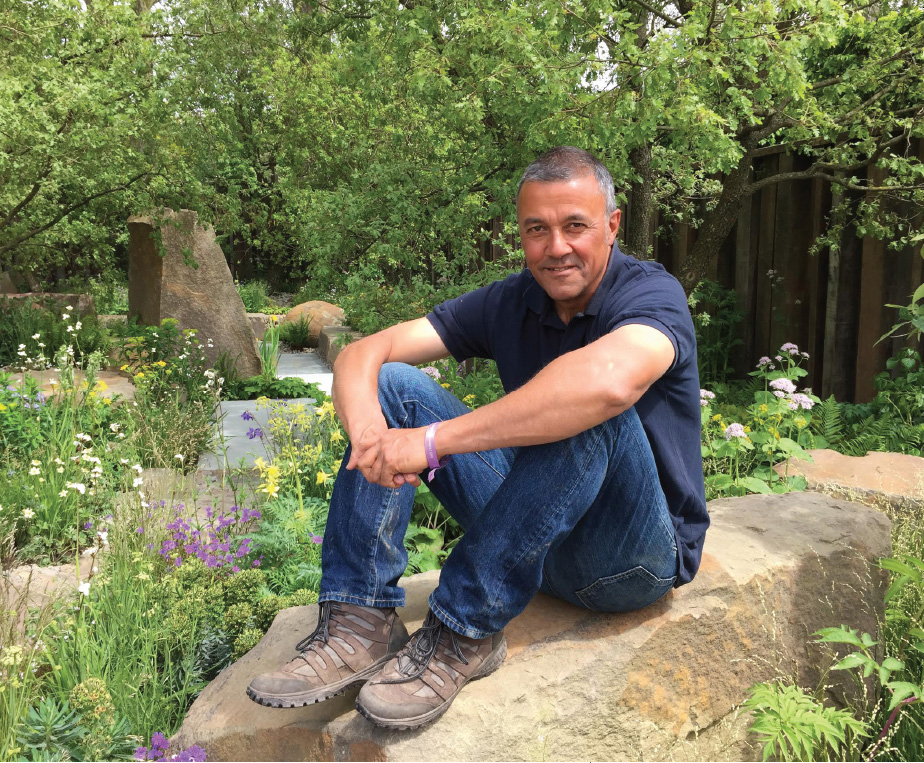Pagebreaks of the print version

THE SUPER ORGANIC GARDENER
Everything You Need to Know About a Vegan Garden
THE SUPER ORGANIC GARDENER
Everything You Need to Know About a Vegan Garden
MATTHEW APPLEBY
First published in Great Britain in 2018 by
PEN & SWORD WHITE OWL
An imprint of
Pen & Sword Books Ltd
Yorkshire - Philadelphia
Copyright Matthew Appleby 2018
ISBN 9781526737472
eISBN 9781526737489
Mobi ISBN 9781526737496
The right of Matthew Appleby to be identified as Author of this work has been asserted by him in accordance with the Copyright, Designs and Patents Act 1988.
A CIP catalogue record for this book is available from the British Library.
All rights reserved. No part of this book may be reproduced or transmitted in any form or by any means, electronic or mechanical including photocopying, recording or by any information storage and retrieval system, without permission from the Publisher in writing.
Pen & Sword Books Limited incorporates the imprints of Atlas, Archaeology, Aviation, Discovery, Family History, Fiction, History, Maritime, Military, Military Classics, Politics, Select, Transport, True Crime, Air World, Frontline Publishing, Leo Cooper, Remember When, Seaforth Publishing,
The Praetorian Press, Wharncliffe Local History, Wharncliffe Transport, Wharncliffe True Crime and White Owl.
For a complete list of Pen & Sword titles please contact
PEN & SWORD BOOKS LIMITED
47 Church Street, Barnsley, South Yorkshire, S70 2AS, United Kingdom
E-mail:
Website: www.pen-and-sword.co.uk
Or
PEN AND SWORD BOOKS
1950 Lawrence Rd, Havertown, PA 19083, USA
E-mail:
Website: www.penandswordbooks.com
ACKNOWLEDGEMENTS
Cleve West for his foreword; Kath Gavin of Hulme Community Garden Centre; David Graham of the Vegan Organic Network, Garden Organic, Veganuary, West 6 Garden Centre, Hortus Loci. Jon Wright, Janet Brookes of Pen & Sword; my editor, Carol Trow; Rachel Webb, Bethan Norris and Janet Watson for all their help and last, but by no means least, William and Ted, my children.
Unless otherwise specified, all images are the copyright of the author.
FOREWORD
by Cleve West, Chelsea Flower Show best in show winner and vegan organic gardener
I ts around 10 years since I visited Iain Tolhursts Hardwick Estate in Oxfordshire to learn about his organic, stock-free system that excludes fertiliser derived from animals. I was vegetarian at the time and hadnt quite made the connection with vegan ethics but was already experimenting with green manure and had, from the outset, adopted a live-and-let-live policy at our West London allotment, where nothing was killed deliberately. In essence, this is what veganism is about, a way of life that seeks to avoid, where practically possible, all forms of exploitation and cruelty to animals for food, clothing and any other purpose. Of course, there are always going to be unavoidable, accidental deaths among smaller, unseen creatures. The aim is to avoid the deliberate, unnecessary ones.
After becoming a fully-fledged ethical vegan in 2015, I started to do a little research of my own and found that not only are animal products the leading cause of the most common diseases in the western world, but also that the negative impact of animal agriculture on climate change and the wider environment (rainforest destruction, species extinction, pollution and ocean depletion to name a few) is reason enough to adopt a plant-based diet.
The facts are staggering and, in truth, disturbing. But challenging the morality of peoples eating habits that have been endorsed for centuries by culture, tradition, convenience and the propaganda from the food and pharmaceutical industries isnt easy. People dont like being told what to do at the best of times let alone when it goes against everything theyve been taught since birth. However, thanks to the internet, (which has helped expose the truth behind animal agriculture) veganism is at last being taken seriously and, with over 1 per cent of the UK now adopting a plant-based diet, being vegan shows genuine concern for environmental issues and the unnecessary commodification of animals on an unimaginable scale.
So, I was delighted when Matthew asked me to write this foreword for this book. Gardeners are a sensitive bunch and, in my experience, most already consider themselves environmentalists. They are well-placed, therefore, to become a driving force to educate others about the challenges this planet faces from the increasing threat of climate change and how to feed an ever-growing population.
The vegan movement is gathering pace, particularly with the young who are concerned for the future of this wonderful planet and its inhabitants and who can see the benefits of a kinder, more compassionate world. But its not exclusively their gig. Old farts like me are welcome too and I can honestly say that my only regret I have about becoming vegan is not having done it a whole lot sooner. 
Cleve West.
INTRODUCTION
Super-organic, clean, vegan growing means you, as an individual, are not only doing something good environmentally, but you also will feel better about yourself.
O n a worldwide scale, super organic vegan food production could mean more efficient land use. This is because animal farming uses 85 per cent of agricultural land. One-third of humanitys freshwater footprint relates to animal products up to 76 trillion gallons. And animal agriculture is responsible for an estimated 18 per cent of greenhouse gas emissions.
Organic, plant-based diets mean fewer cancers and allergies as well as a reduction in diabetes, heart and gut illness. They also avoid the transmission of E. coli, salmonella, BSE, bird flu and other animal-borne diseases to humans.
UK animal consumption is more than one billion units a year. But it is the animals you dont eat that cost the most environmentally, and suffer the most. The dairy farming industry has as much involvement in animal cruelty and environmental damage as the meat industry. Thus, by opting for super organic vegan food production, you are no longer supporting practices linked to both animal-related cruelty and diseases.
To you as a gardener, all this may not seem to mean much. But gardening supports environmentally damaging animal farming in several ways the vast use of animal by-products being just one. Fortunately, changing how you garden is straightforward. Firstly, just dont use products that you think might be harmful to the environment. Then, remove those that might have been produced through the exploitation or death of animals. Next, replace with organic fertiliser and compost; striving to cause the least suffering to the planet and its creatures, while still gardening as successfully as possible, is the objective.

